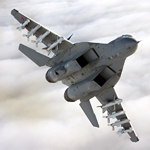MiG-35 lost in the Indian Air Force tender

A European fighter aircraft is likely to provide the much-needed boost to India’s air power after the defence ministry preferred them over Russian and American aircraft such as the latest in the MIG series, the MIG-35, and the F-16 and the F-18. Rafale, built by France’s Dassault and the Eurofighter Typhoon built by a pan-European consortium, were shortlisted by the defence ministry on Thursday.
The two companies, which produces the aircraft, have been told to keep their commercial bids open till December 31, 2011. Others, such as America’s Boeing, Lockheed Martin, Sweden’s Saab, Russia’s Migoyan , the makers of MIG, have been told that their aircraft are no longer in contention.
The announcement marks a significant, though much-delayed, step in government’s efforts to strengthen the rapidly depleting air power and ensure that it is ready to meet the challenge of combating a resurgent China and an ambitious Pakistan.
India’s air force now has about 30 squadrons, far below its sanctioned strength of 39. Old mainstays such as MIG-21 are being phased out, while aircraft like the Jaguar and the Mirages are undergoing an upgrade and are too few in number to make a significant difference. The air force desperately needs modern aircraft with the ability to perform what is called the ‘swing role’, attack incoming ground-based targets in enemy territory as well as defend the nation’s skies against an invasion. The shortlisted aircraft, the ministry feels, fit the role perfectly.
“Yes, the ministry has asked the two companies to extend the dates of their commercial bids. The other four companies are no longer in the running and have been notified on Wednesday,” ministry spokesman Sitanshu Kar told ET.
The development, however, is a huge blow for Boeing and Lockheed. The preference of European vendors over American ones for one of the most visible military aviation contracts currently in play, will be seen as an interesting move by the government given the recent strategic closeness between New Delhi and Washington.
During his landmark visit last year, President Obama had repeatedly spoken of the “US-India indispensable partnership of the 21st Century,” and had also announced two big-ticket defence deals. US officials had lobbied long and hard with India for Boeing and Lockheed.
Timothy Roemer , the US ambassador, who annnounced his decision to resign from his role on Thursday, said he was disappointed. “We are…deeply disappointed by this news. We look forward to continuing to grow and develop our defence partnership with India,” Mr Roemer said. While political relations between the two nations are not expected to sour, Thursday’s decision could be seen as a sign of India looking to advance its trade and defence ties with Europe.
The deal has seen fierce competition between the six contenders, and has been the object of intense lobbying by the head of states of their respective countries, including, US President Barack Obama , Russian President Dmitry Medvedev and French President Nicolas Sarkozy , during their visits to New Delhi last year
http://economictimes.indiatimes.com